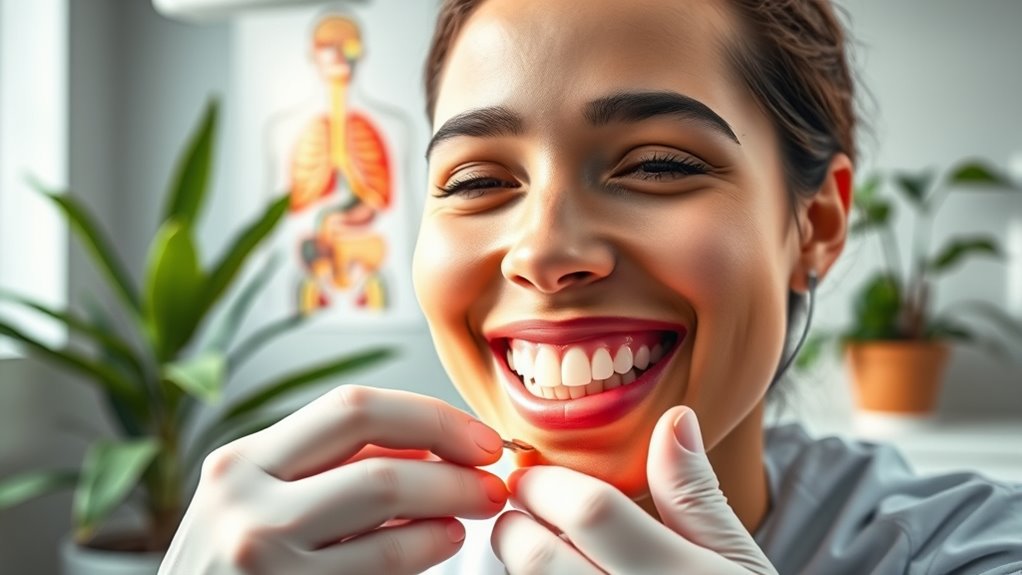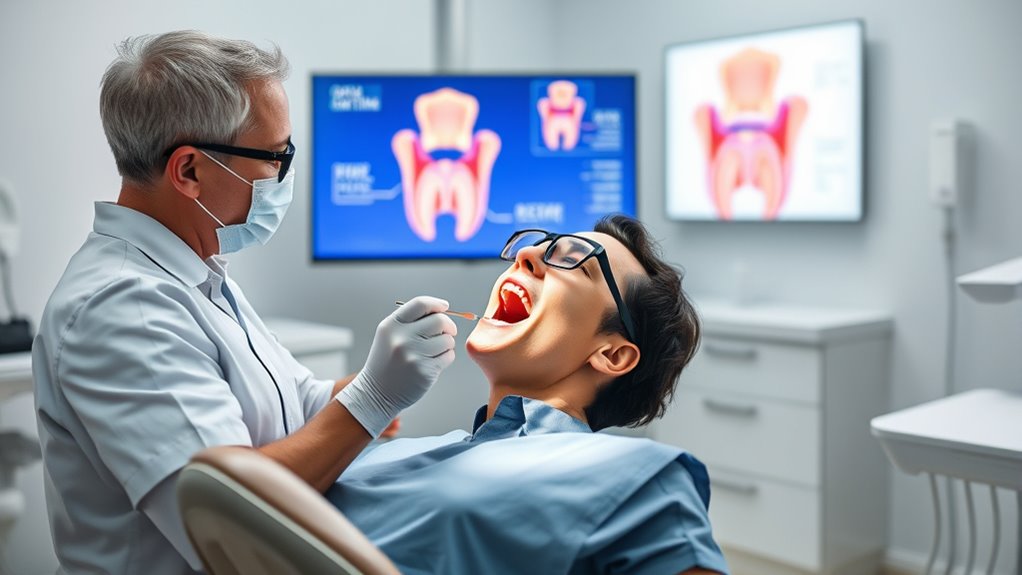Holistic dentistry links your oral health to your overall well-being, emphasizing how mouth issues can affect systemic conditions like heart disease, neurological problems, and immune health. By choosing biocompatible materials and safe removal methods, you reduce toxins like mercury that may harm your body. Addressing infections and preventing chronic inflammation can support better health everywhere. Keep exploring to discover how your dental choices influence your entire body’s wellness.
Key Takeaways
- Holistic dentistry considers how oral health impacts overall systemic conditions like heart disease and immune function.
- Mercury amalgam fillings may release toxins that contribute to neurological and systemic health issues.
- Using biocompatible materials reduces inflammation and allergy risks linked to chronic systemic diseases.
- Proper removal of toxic amalgam fillings minimizes mercury exposure, supporting overall health.
- Addressing oral infections and choosing safe dental materials can help prevent systemic health problems.

Holistic dentistry offers an all-encompassing approach to oral health that considers the interconnectedness of your mouth, body, and overall well-being. Unlike traditional dental practices that focus mainly on treating teeth and gums, holistic dentistry recognizes how oral health impacts your systemic health. For example, certain dental materials and procedures can influence your body’s overall functioning. You might not realize that choices made during dental treatments, like the type of fillings used, can have broader health implications.
Many conventional dentists still use mercury fillings, which are durable and inexpensive but pose potential health risks. Mercury is a toxic element, and when these amalgam fillings are placed or removed improperly, mercury vapors can be released into your mouth and bloodstream. This exposure may contribute to issues like neurological problems, immune system suppression, and even cardiovascular concerns. Holistic dentists emphasize the importance of replacing mercury fillings with safer alternatives. They often recommend biocompatible materials, which are substances compatible with your body’s tissues and reduce the risk of allergic reactions or toxicity. These biocompatible materials, such as composite resins, ceramic, or glass ionomers, are designed to be safe, durable, and free from harmful metals.
When you visit a holistic dentist, you’ll find that they prioritize the use of these safer materials, especially if you’re concerned about sensitivities or existing health conditions. They understand that the materials used in your dental work can influence your systemic health, and they aim to minimize any potential negative effects. Removing mercury fillings isn’t just about replacing them; it involves careful procedures to ensure your safety and minimize mercury exposure during removal. The process often includes protective measures like rubber dams and specialized ventilation.
Holistic dentistry also considers other biocompatible materials that support your health. For example, they might recommend ceramic crowns over metal-based ones because ceramics don’t conduct heat or electricity and are less likely to cause allergic reactions. This approach aligns with their goal of supporting your body’s natural healing processes and reducing chronic inflammation, which is linked to systemic diseases like heart disease, diabetes, and autoimmune disorders. Additionally, choosing piercing care and hygiene practices that minimize infection risk can further support your overall health, since oral infections are connected to systemic conditions.
In essence, holistic dentistry isn’t just about fixing teeth—it’s about nurturing your overall health. By choosing biocompatible materials and avoiding potentially toxic substances like mercury fillings, you’re taking steps to improve your long-term well-being. This all-inclusive approach recognizes that your oral health and systemic health are inextricably connected, and thoughtful choices today can have lasting benefits for your entire body.
Frequently Asked Questions
How Does Holistic Dentistry Differ From Traditional Dental Practices?
Holistic dentistry differs from traditional practices by focusing on your overall health, not just your teeth. You’ll find they avoid mercury amalgam fillings, opting for safer, biocompatible materials. Instead of just treating symptoms, holistic dentists consider how oral health impacts systemic health. They look at your lifestyle, diet, and environment, aiming for natural, integrative solutions that promote your well-being beyond the mouth.
Are There Specific Systemic Diseases Directly Linked to Oral Health?
Imagine your mouth as a gateway, revealing clues about your overall health. You should know that periodontal disease isn’t just about gums; it’s linked to serious conditions like cardiovascular health. When bacteria from your mouth enter your bloodstream, they can cause inflammation, increasing your risk for heart disease. So, taking care of your oral health isn’t just about your smile—it’s essential for your systemic well-being.
What Alternative Treatments Are Used in Holistic Dentistry?
In holistic dentistry, you explore alternative treatments like natural remedies and nutritional therapies to support your oral health. These approaches focus on using non-invasive methods, such as herbal treatments, detoxification, and personalized diet plans, to promote healing and prevent disease. You might also incorporate supplements and lifestyle changes, aiming to address underlying issues rather than just symptoms, fostering overall wellness and a healthier mouth.
Can Holistic Dentistry Improve Overall Wellness Beyond Oral Health?
Think of your body as a finely tuned orchestra—you need each part to work harmoniously. Holistic dentistry can boost your overall wellness by addressing more than just your teeth. Through nutritional counseling and detoxification therapies, it helps remove toxins and nourish your body from within. This integrated approach supports better energy, immunity, and balance, proving that oral health truly echoes throughout your entire system.
Is Holistic Dentistry Suitable for Children and Pregnant Women?
You might wonder if holistic dentistry suits children and pregnant women. It’s a great choice because it emphasizes gentle, non-toxic methods that support pediatric dental health and prenatal care. By focusing on natural treatments, you can help protect their developing bodies and overall wellness. Holistic dentistry promotes safe, effective strategies tailored to these sensitive groups, ensuring their oral health benefits positively impact their systemic health too.
Conclusion
So, next time you brush or visit the dentist, remember—your mouth isn’t just about a sparkling smile. It’s a gateway to your overall health, yet many overlook this essential connection. Ironically, what’s in your mouth can silently influence your entire body, reminding you that ignoring holistic care might just be the biggest mistake. Maybe it’s time to see your dentist not just as a teeth fixer, but as a partner in your lifelong health journey.










